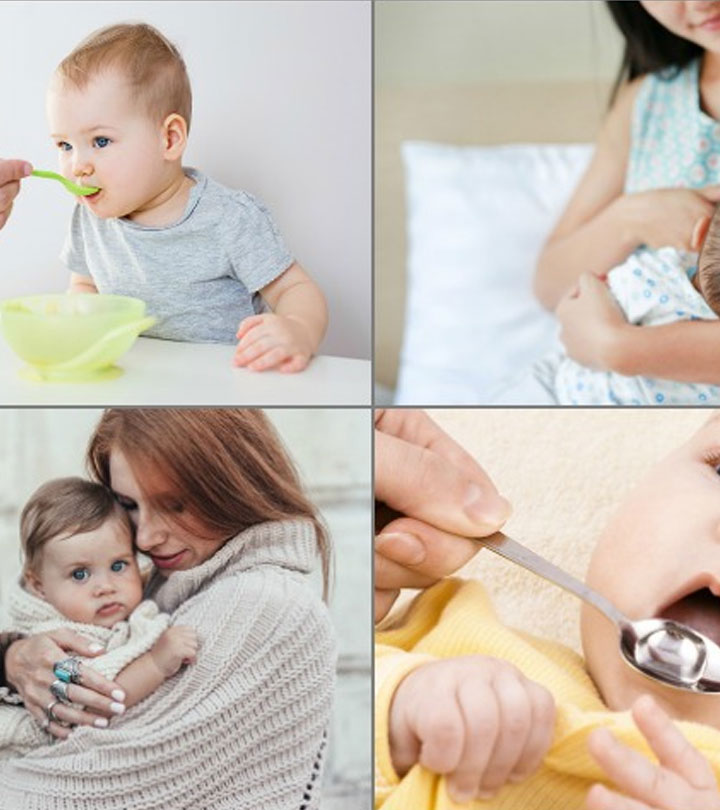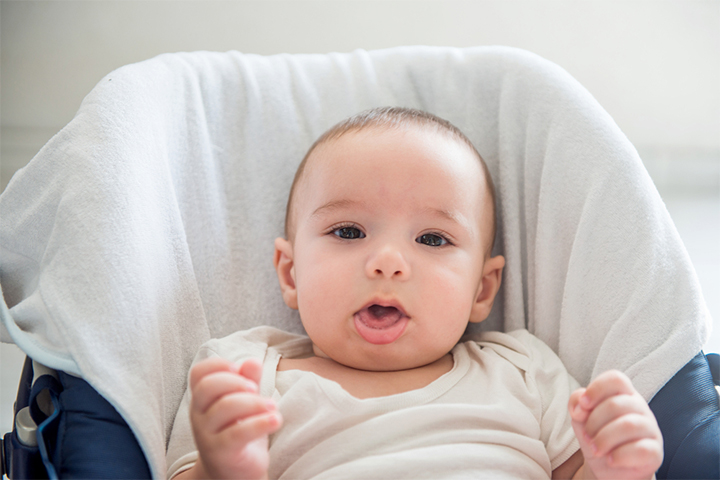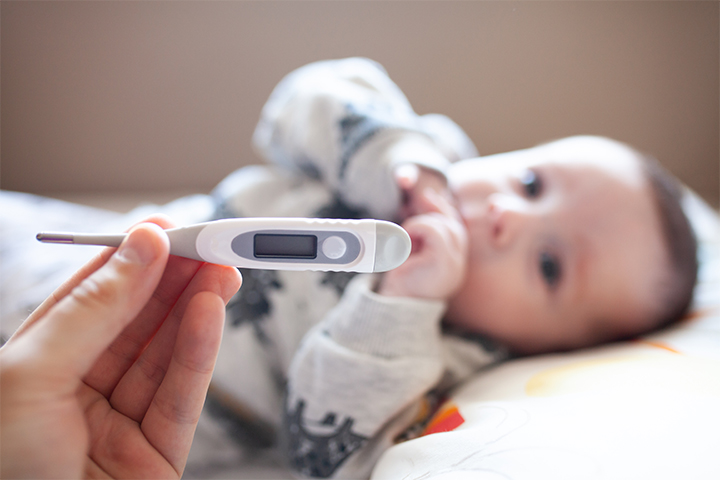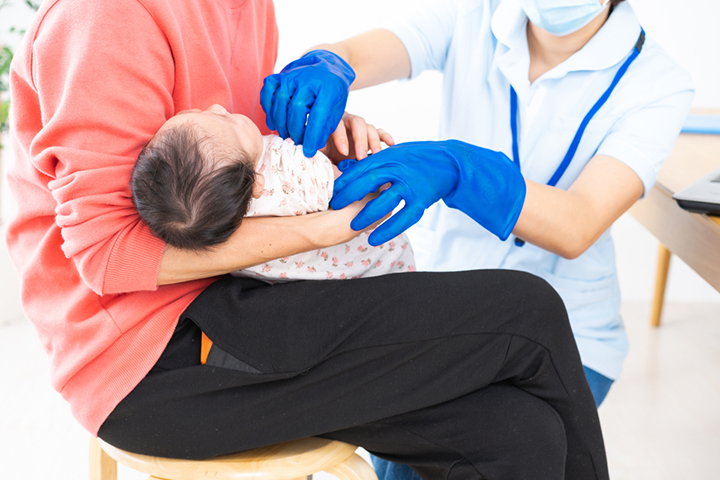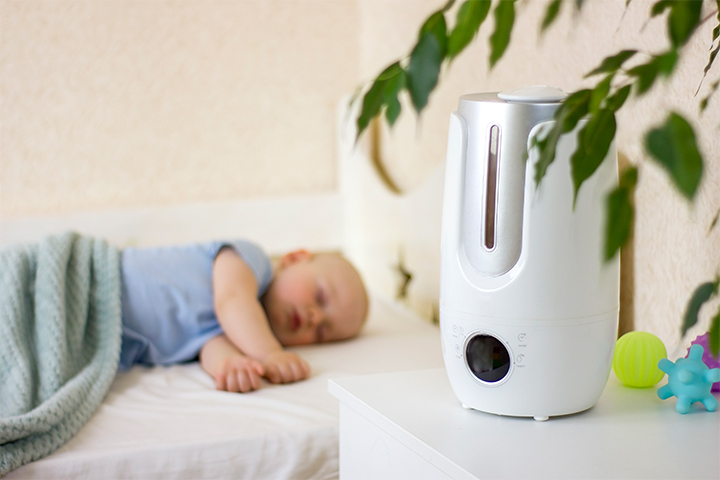Coughing is one of the body’s defense mechanisms of getting rid of phlegm, mucus, sputum, postnasal drip, or a foreign body. A variety of factors can cause cough in babies, and while coughing is a necessary function, it is unhealthy for a newborn to cough excessively. If your infant coughs a lot, you should see a pediatrician (1). Read this post to learn more about infant coughs, their types, causes, treatment, and prevention methods.
Types Of Baby Cough
Cough can be classified based on character, duration, quality, and timing as follows (2) (3).
- Acute cough:A sudden onset of cough that lasts from a few days to less than three weeks.
- Subacute cough: Lasts around three to eight weeks. Slow in onset.
- Chronic or persistent cough: Lasts more than eight weeks, usually from allergies or asthma. It occurs off and on. It can also be due to infections.
- Dry cough: Non-productive cough where there is no sputum production. Generally hacking cough.
- Wet cough: Productive cough (phlegm) with sputum.
- Nocturnal cough: Occurs at night and can be due to postnasal drip (mucus from nose and sinus drain to throat) or asthma. Mainly allergic cough.
- Daytime cough: Occurs during the day and can often be allergic to smoke, air fresheners, pets, etc.
Cough can be classified based on their character, which is the nature of air’s movement during the cough (3).
- Barking cough: It can be due to swelling and inflammation in the upper airway, usually the larynx and trachea, due to the pneumoniaiXA bacterial or viral infection causing inflammation and fluid accumulation in the air sacsin toddlers and infants” ] that interferes with taking the breath in. Inspiration. It may start suddenly during the night. You may hear stridor, which is a loud noise from harsh breathing while inhaling air. It is caused by croup (4).
- Whooping cough: It is a type of continuous cough without gaps to breathe in between coughing. The whooping sound is heard when the baby takes a deep breath at the end of the coughing episode. It is caused by pertussis infection by bacterium Bordetella pertussis and is common in unvaccinated babies under the age of one year (5).
It is a contagious infection and can have severe effects on babies. The accompanying chart illustrates the pertussis frequency in children of various age groups. According to the US Centers for Disease Control and Prevention (CDC), pertussis most commonly affects babies under one year. The green line on the graph displays the occurrence of whooping cough among infants younger than one year.
Pertussis incidence in the US by age group
Source: Pertussis (Whooping Cough); Surveillance and Reporting; CDC/NNDSS [(Age group years),( (13).[/mj_protip]
- Staccato cough: The baby breathes in between each cough. It is a characteristic symptom of chlamydial pneumonia in babies (6).
Symptoms Associated With Baby Cough
Coughing by itself can be a symptom of respiratory tract infection or a simple reflex to an irritant such as smoke. The following symptoms could also occur along with cough in babies (3):
- Cough with wheezing: Wheezing is a whistling sound that occurs while breathing out (expiration). The whistling sound can be heard from a distance. The child becomes breathless. It can be due to lower airway tract infections such as viral pneumonia, asthma, or bronchiolitisiXA viral illness that makes the airways constrict, making breathing challengingor due to foreign bodies such as food or small toys.
- Cough with a fever: Your baby may get a mild or high grade fever depending upon the severity of infection, whether mild flu or pneumonia. Body temperature more than 102°F (39°C) can be due to infections such as pneumonia.
- Cough with vomiting: If your baby has asthma or cold, they may vomit due to excess mucus accumulated in the stomach due to swallowing it. Or the mucus can get collected in the upper throat. Sometimes, they may vomit due to the stimulation of gag reflex while coughing.
When Should You Call The Doctor?
It is recommended to contact a pediatrician if your baby has a cough. Your baby may require immediate medical care in the following circumstances with cough (3) (7).
- Difficulty in breathing
- Breathing faster than usual. Generally depending on the age but respiratory rate more than 40 per minute.
- Chest indrawing.
- Blue color of the lips, face, or tongue
- High fever
- High fever with cough, without a stuffy or runny nose
- High or mild fever in infants less than three months old
- Cough more than few hours in infants younger than three months
- Whooping sound after cough
- Barking cough
- Coughing up blood
- Stridor (sharp sound while breathing)
- Wheezing
- Tiredness and irritability
- Dehydration symptoms such as dry mouth, sunken eyes, no tears, and less urine
What Are The Causes Of Coughing In Babies?
Baby’s cough can be due to various factors ranging from teething to severe bacterial infections such as pertussis. Respiratory infections like common cold, flu, and others may also cause a cough. The US Centers for Disease Control and Prevention reported that in 2021, approximately 18.9% of children experienced seasonal allergies, which can also result in cough. The common causes include (8):
- Viral infections such as the common cold, croup, etc., are caused by viruses such as rhinovirus and others.
- Bacterial infections of airways such as pertussis
- Allergic cough
- Asthma
- Sinusitis
- Pneumonia
- Bronchiolitis
- BronchitisiXInflammation of the bronchial tubes caused due to a viral or bacterial infection
- Gastroesophageal refluxiXA condition that occurs when stomach acids flow backward into the esophagus
- Congenital heart and respiratory problems
- Foreign bodies
- Cystic fibrosisiXA genetic disease characterized by the build-up of mucus and affects the lungs, digestive system, and other organs
- Airway irritants
- Aspiration of food
- Teething due to excess saliva
- Habitual cough
Diagnosis Of Cough In Babies
Your doctor makes a diagnosis by hearing the type of cough and other signs and symptoms. The diagnostic tests to identify the cause of cough may include the following.
- Blood test
- Chest x-ray
- Sputum culture
- BronchoscopyiXA technique in which the professionals use a tiny tube to view your lungs and diagnose lung disorders
Treatment Of Cough In Babies
After identifying the cause of the cough, your doctor will recommend the appropriate treatment.
- Cough due to bacterial infections requires antibiotic treatment.
- A viral infection related cough requires supportive therapies.
- Cough medicines are usually not recommended for children.
It is advised not to give over-the-counter cough syrup or cough drops to your baby since they have the risk of causing serious complications such as slow breathing, choking, etc. (9).
How To Prevent Cough In Babies?
The following factors may help prevent cough in babies.
- You can prevent exacerbation of asthmatic cough by following prescribed medication.
- Do not give small toys, which may be choking hazards.
- Keep the baby away from smoke.
- Follow proper feeding techniques to avoid food aspirations.
- Get recommended vaccinations on time.
- Try to protect your baby from contracting viral illnesses such as flu or cold if you have it and are experiencing sneezing and coughing.
Home Treatment For Babies With Cough
The following home remedies may help relieve cough in babies (7):
- Give plenty of fluids or breastmilk to soothe the throat and prevent dehydration.
- The baby will need more rest.
- Prevent the drying of the nose and throat by using a cool-mist vaporizer or humidifier near a baby crib.
- Saline drops can be used if your baby has a stuffy nose. Bulb syringe or other suction tools can be used to clean the nose in infants.
- Dress your baby in warm clothing in winter months.
- Keep away irritants such as pets, air fresheners, or dust from your baby.
Cough in babies could be due to a temporary irritation to their airway or an underlying infection. If your baby is frequently coughing or shows any other symptoms of an infection, consult your pediatrician for prompt medical attention. The treatment would be provided based on the cause. Refrain from giving over-the-counter cough medications to children. Also, check with your physician which home remedies you could try with your baby (10). Note that home remedies may provide temporary relief only and may not be a permanent solution to cure cough.
Key Pointers
- A cough can be accompanied by other symptoms such as wheezing, fever, and vomiting.
- It is important to consult a doctor if your baby experiences breathing difficulties, breathes faster than usual, if your child’s lips, face, or tongue turn blue, if they have a high fever or cough up blood.
- A baby’s cough can be caused by various factors, ranging from teething to severe bacterial infections such as pertussis.
- Coughs are typically treated with antibiotics and supportive therapies, but cough syrups are not usually recommended for children.
- To treat a cough at home, it’s best to get plenty of rest, fluids, use a humidifier, use saline drops for stuffy nose, wear warm clothes, and avoid irritants.
